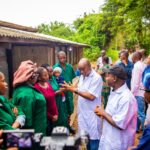Cyriacus Nnaji
Professor Olaitan Opere, a professor of Microbiology has tasked government of Nigeria on measures for safe disposal of antimicrobial wastes from food, human health and animal health systems and manufacturing facilities.
Opere stated this as part of her recommendations as the Lecturer of the 90th inaugural lecture of the Lagos State University (LASU)
She said “The government should put in place measures to safely dispose of antimicrobial waste from food, human health and animal health systems and manufacturing facilities.”
The theme of the lecture which took place at the Buba Marwa Auditorium of the institutions main campus at Ojo, on Tuesday, August 1, 2023, was ‘Microbes in the environment: Unseen Femmes Fatales and Virtuous Saviours.’
Other recommendations by the erudite professor include Regular sanitation using chemical cleaners which is important in prevention of pathogenic microbes from contaminating telephones and computers and should be done periodically in companies, banks and institutions.
She further advocated the need to strengthen one-health action plans surveillance and monitoring of antimicrobial resistance (AMR) and antimicrobial consumption in the environment.
Other recommendations include reduction in the amount of antimicrobial waste entering the environment, farms, hospitals and other sources.
And also increasing agricultural production in a more economically and environmentally sustainable way, “There is need to use fewer chemical fertilizer and increase plant tolerance to abiotic stress. The use of Plant Growth-promoting Microorganisms (PGPM) is a potentially advantageous technique for improving crop productivity, food quality and security in a more sustainable and eco-friendly agricultural system.”
Earlier Opere educated her listeners on the meaning of Microbiology saying is the study of microorganisms, or microbes. “Microbes constitute a diverse group of generally minute simple life-forms invisible to naked eyes that include mainly bacteria, archaea, algae, fungi, protozoa, which are all cellular and the viruses which are acellular.”
In her conclusion the Science expert said, “As a Microbial Ecologist, my research on Microbial Diversity in soils, foods, plants as well as inanimate objects that man often gets in contact with such as computer keyboards and mice, telephones, shopping carts, door handles of some public places has shown microbes to be femme fatales as well as virtuous saviours, being more of saviours than femme fatales.
“There is considerable overlap among the specific branches of microbiology and with other disciplines. Microbes, which are the smallest living things are ubiquitous and have found applications in several fields and disciplines including medical sciences, agricultural sciences, and engineering and other scientific fields including physics and geology.
“Changing lifestyles, industrialisation, and rise in population have resulted in the genesis of pollutants making the environment and human health to deteriorate. Biological approaches employing microorganisms are gaining importance as an eco-friendly and cost-effective substitute to mitigate the pollution load, as virtuous saviours of our environment. Microbes mediate biological, physical and chemical processes,” she added.
She stated that in a possibly depressed economy, it is time to exploit the vast opportunities in the field of microbiology for national development. “Many microbes are indeed beneficial, a few detrimental and the majority harmless or free-living. In a possibly depressed economy, it is time to exploit the vast opportunities in the field of microbiology for national development. It is not possible to escape the microbial world, as microbes will remain relevant to us in several ways such as food, food supplements, drugs and antibiotics, normal resident of our bodies, source of fuel, electricity and green chemicals.
“Microbes are ubiquitous causing problems in many sectors, producing several industrial products and they are agents for the restoration of contaminated environments and treatment of the diverse waste generated by man, and in the process, create opportunity for jobs and business. However, these opportunities can be harnessed only through research collaboration with other disciplines. Such collaboration could result in development of good product and commercialization,” Opere stated.
Further, Professor Opere added that Microbes are creating jobs for the microbiologists, agriculturists, laboratory scientists, doctors, pharmacists, nurses, engineers and others.



